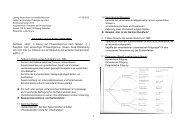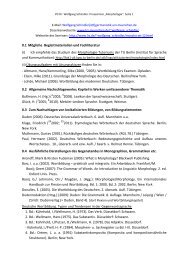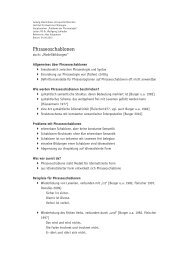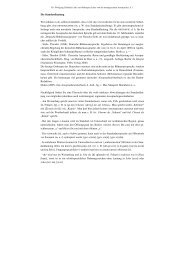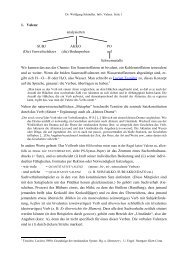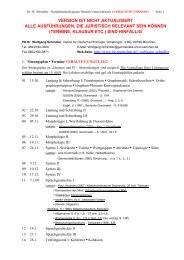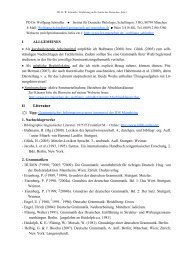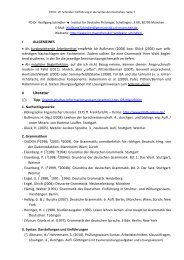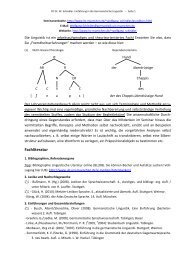Chapter 18 Lexical Functions: Description of Lexical Relations in a ...
Chapter 18 Lexical Functions: Description of Lexical Relations in a ...
Chapter 18 Lexical Functions: Description of Lexical Relations in a ...
You also want an ePaper? Increase the reach of your titles
YUMPU automatically turns print PDFs into web optimized ePapers that Google loves.
—<strong>Chapter</strong> <strong>18</strong>. <strong>Lexical</strong> <strong>Functions</strong>— 92<br />
12. Ch<strong>in</strong>ese<br />
Magn(yu‹ (ra<strong>in</strong>N)) = dà (big) Oper 1(lü]tú (tripN)) = tàshàng [~] (walk on)<br />
Magn(lùnjù (argumentN)) = yo‹ulì-de (hav<strong>in</strong>g strength) Oper 1(xiéyí (dealN)) = dáchéng [~] (reach)<br />
Magn(zha‹ngshēng (applause)) = léidòng (thunderous) Oper 1(qiàn (apology)) = dào [yīge ~] (say) [an apology])<br />
Magn(di#kàng (resistance)) = wánqiáng-de (firm, solid) Oper 1(di#kàng (resistance)) = jìnxíng [~] (proceed to)<br />
For LFs <strong>in</strong> Korean, see Hong 1995 and Lee, Park & Kim 2001.<br />
13. Malagasy<br />
Magn(orana (ra<strong>in</strong>N)) = be (abundant),<br />
mivatravatra (violent) Oper 1(dia (tripN)) = manao [~] (do)<br />
Magn(hevitra (argumentN)) = mitomb<strong>in</strong>a (conv<strong>in</strong>c<strong>in</strong>g) Oper 1(fifanaraha (dealN)) = manao [~] (do)<br />
Magn(tehaka (applause)) = mirefodrefotra (frenzied) Oper 1(azafady (apology)) = manao [~] (do)<br />
Magn(fanoherana (resistance)) = lehibe (grande) Oper 1(fanaherana (resistance)) = manao [~] (do)<br />
Collocations described by LFs are not only wide-spread <strong>in</strong> modern languages—they were<br />
present already at the earliest stages <strong>of</strong> language development. Thus, Gamkrelidze & Ivanov<br />
1984: 833-834 show the existence <strong>of</strong> LF-collocations <strong>in</strong> Proto-Indo-European, for <strong>in</strong>stance:<br />
(<strong>18</strong>) a.*nom(e/o)n *d h eH- lit. (put [a] name) = (establish/give a name)<br />
[*d h eH = CausFunc 1(*nom(e/o)n)]<br />
b. *k h leu̯o- *d h eH- lit. (put glory) = (acquire glory)<br />
[*d h eH = Caus 1Func 1(*nom(e/o)n)]<br />
After the demonstration <strong>of</strong> the importance and the power <strong>of</strong> LFs, a few words <strong>of</strong> caution are<br />
<strong>in</strong> order. What I said <strong>in</strong> this subsection should by no means be construed as imply<strong>in</strong>g that the<br />
same set <strong>of</strong> simple standard LFs is valid for any language: this is simply not the case, and this is<br />
so for two reasons.<br />
• First, a simple standard LF can be <strong>in</strong>applicable <strong>in</strong> some languages. Thus, Bambara does not<br />
have readily available nom<strong>in</strong>alizations (S 0), so that collocations <strong>of</strong> the type put up resistance,<br />
<strong>of</strong>fer apologies or get a refusal are mostly impossible <strong>in</strong> this language; f<strong>in</strong>ite verbal forms are<br />
used <strong>in</strong>stead. Therefore, support verb LFs (Oper i, Func i, Labor ij) would be practically useless <strong>in</strong><br />
Bambara: they cannot have enough keywords.<br />
• Second, a simple standard LFs that is applicable <strong>in</strong> the language can have mostly standard,<br />
non phraseologized expressions and, as a result, it is <strong>of</strong> only limited relevance. Suppose that <strong>in</strong><br />
language L the LF Oper 1 is expressed by three support verbs: (make), (have) and (say), distributed


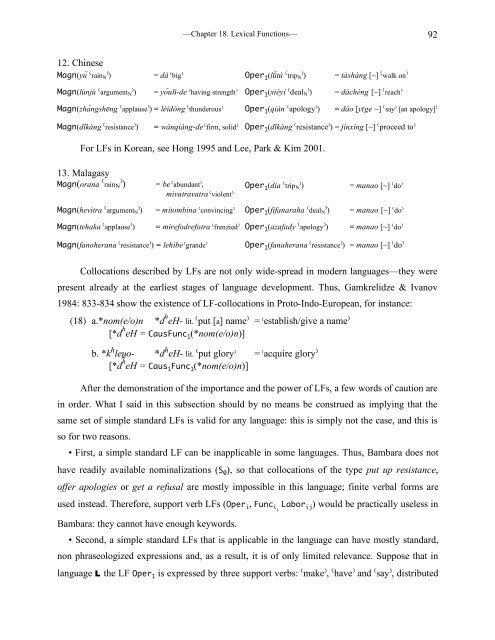
![E-Mail: Wolfgang.Schindler[ätt]germanistik.uni-muenchen.de Web ...](https://img.yumpu.com/51590147/1/184x260/e-mail-wolfgangschindlerattgermanistikuni-muenchende-web-.jpg?quality=85)
